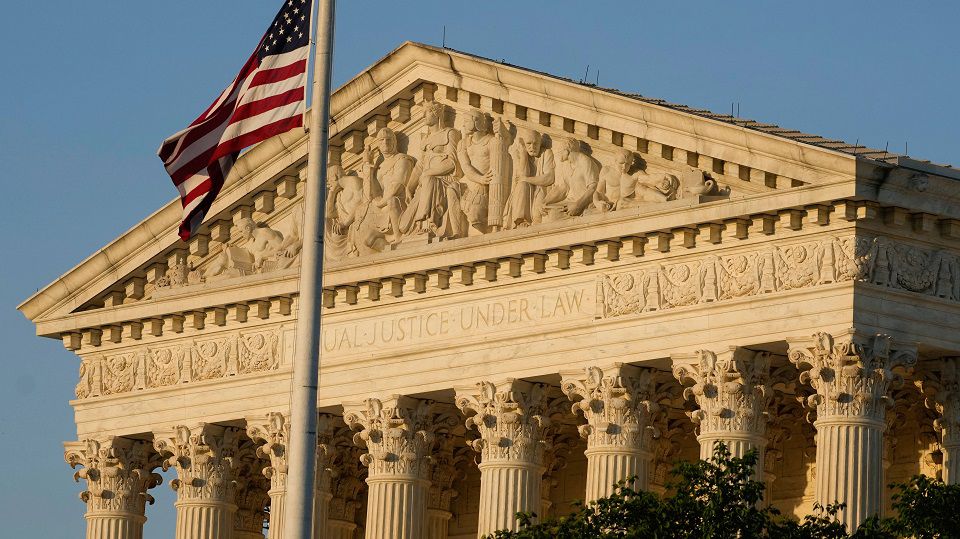A pair of Senate lawmakers on Wednesday unveiled a bipartisan bill that would force the Supreme Court to adopt a code of conduct in the wake of recent controversies surrounding reports of justices on the high court not disclosing travel, property sales and other gifts.
Sens. Angus King, a Maine independent who caucuses with Democrats, and Lisa Murkowski, an Alaska Republican, introduced a bill that would require the high court to create its own code of conduct and appoint an official to review public complaints and potential conflicts. The code would also be posted online so it is available to the public.
The bill, known as the Supreme Court Code of Conduct Act, comes as public confidence in the court is at an all-time low, according to a Gallup survey.
“Americans have made clear their concerns with the transparency — or lack thereof — coming from the Supreme Court and its justices,” Murkowski wrote in a statement about the bill. “It is critical the public has full faith that their institutions are functioning, including the judicial branch.”
“The Supreme Court must demonstrate independence and fairness as they rule on the laws of the land—and any cracks in the public’s confidence will have damaging repercussions for the state of our democracy,” she added.
“A healthy democracy requires trust: trust in systems, trust in institutions, and trust in leaders,” King wrote. “Americans deserve to have confidence that every part of their government – especially the highest court in the land – is acting in an ethical manner.”
The legislation comes amid heightened attention on the justices' travel and private business transactions. The most recent stories about the questionable ethics practices of justices began earlier this month.
First came a ProPublica investigation that revealed that Thomas has for more than two decades accepted luxury trips nearly every year from Republican megadonor Harlan Crow without reporting them on financial disclosure forms. Thomas responded by issuing a statement saying that he was not required to disclose the trips.
A week later, the outlet revealed in a new story that Crow had purchased three properties belonging to Thomas and his family, a transaction worth more than $100,000 that Thomas never disclosed.
Just this week, Politico reported that when Justice Neil Gorsuch sold property he co-owned shortly after becoming a justice, he disclosed the sale but omitted that the property was purchased by a person whose firm frequently has cases before the high court.
And earlier this year, there were stories about the legal recruiting career of Chief Justice John Roberts' wife and whether it raised ethical concerns that she was paid large sums for placing lawyers at firms that appear before the court.
The series of revelations has provoked outcry and calls for reform particularly from Democrats. Next week, the Senate Judiciary Committee will hold a hearing on Supreme Court ethics reform.
“The time has come for a new public conversation on ways to restore confidence in the Court’s ethical standards. I invite you to join it,” wrote Sen. Richard Durbin, D-Ill., in a letter to Chief Justice Roberts urging him to testify.
Roberts declined in his own letter made public Tuesday evening. He wrote that testimony by previous holders of his office before Congress is "exceedingly rare, as one might expect in light or separation of powers concerns and the importance of preserving judicial independence.”
To his letter, however, Roberts attached a “Statement on Ethics Principles and Practices” signed by all nine justices describing the ethical rules they follow about travel, gifts and outside income. “This statement aims to provide new clarity to the bar and to the public on how the Justices address certain recurring issues, and also seeks to dispel some common misconceptions,” the statement read.
But ethics experts and other court observers said the statement that followed and ran just over two pages was nothing new, just “the rehashing of things we already knew and found insufficient,” said Gabe Roth of the watchdog group Fix the Court in a statement.
The statement signed by the justices essentially said that they consult a wide variety of sources to address ethical issues, decide for themselves when a conflict requires that they step away from a case and file the same annual financial disclosure reports as other judges.
The justices have previously resisted calls to write a formal code of conduct.



